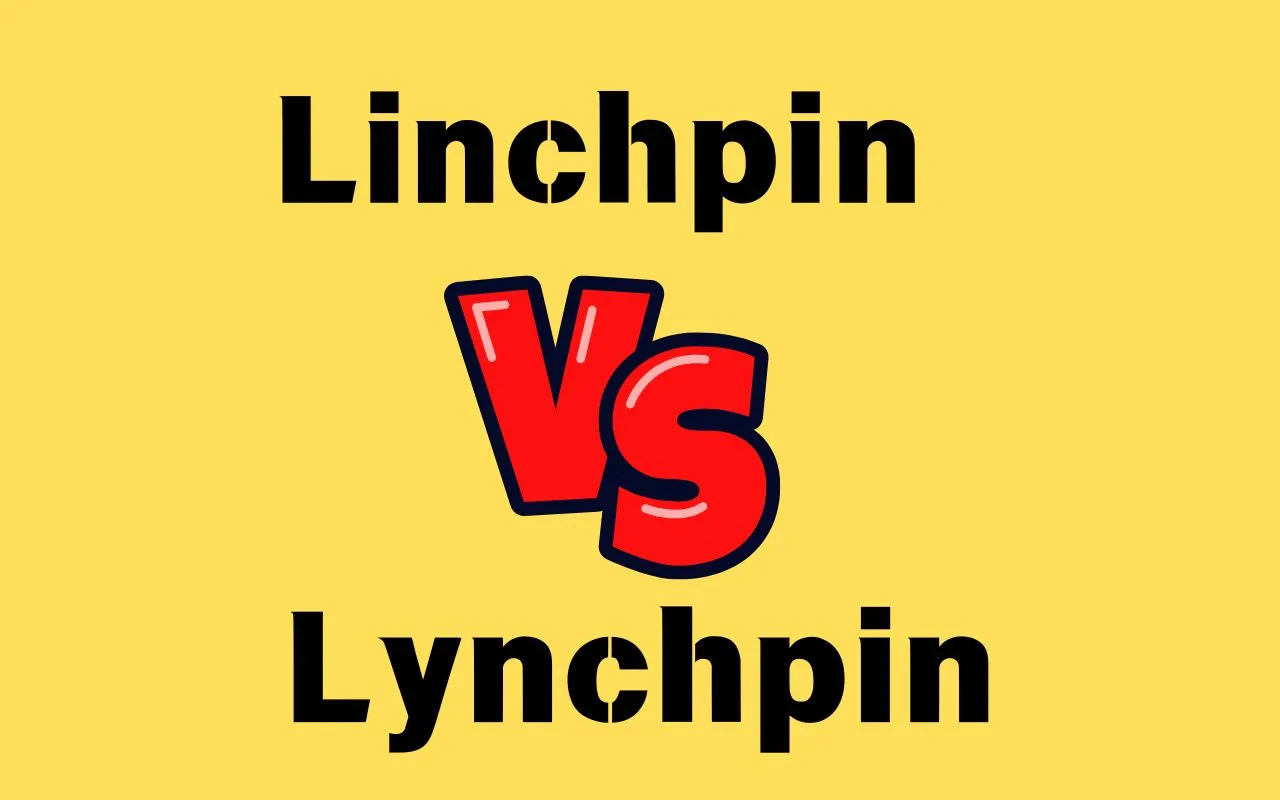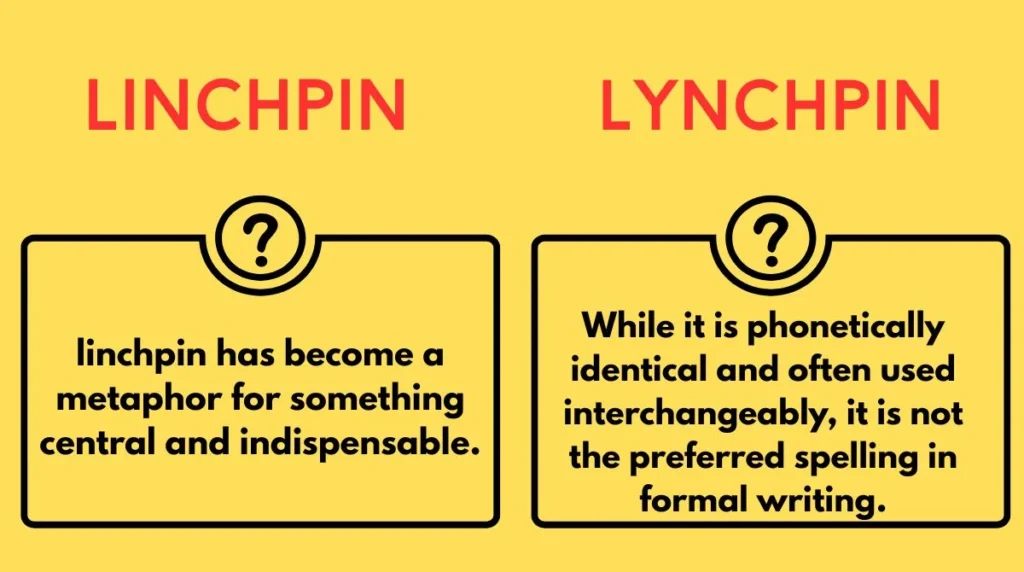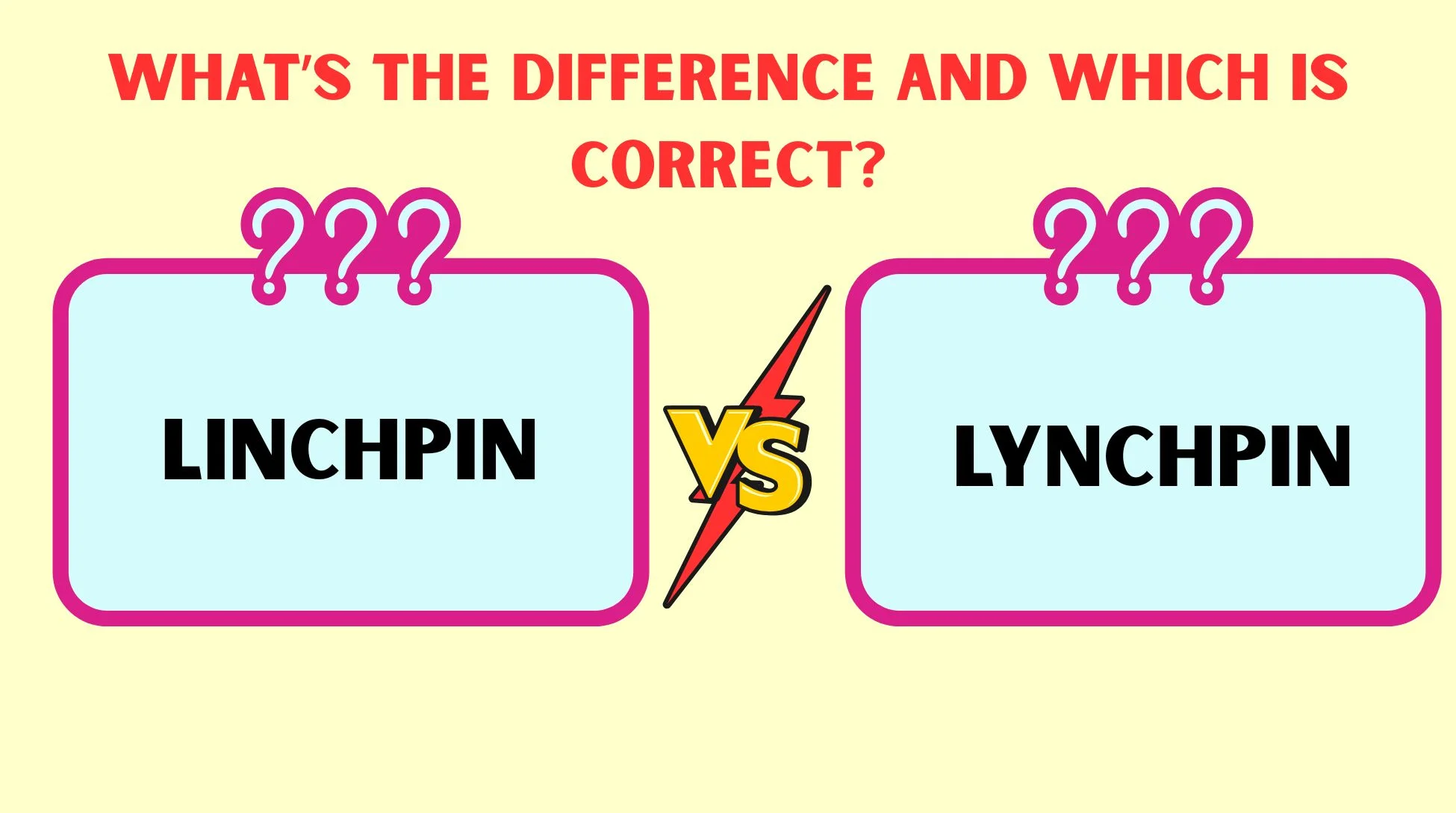Last updated on September 11th, 2025 at 10:00 am
Language is constantly evolving, and spelling variations are no exception. The words lynchpin and linchpin are often used interchangeably, but which one is correct?
And what’s the difference between the two? While the answer may seem straightforward, the history, etymology, and modern usage of these terms reveal fascinating details about their origins and meanings.
Lynchpin or linchpin? Learn the subtle difference between these terms, their origins, and which spelling is correct for professional use.
In this guide, we’ll break it all down, so you can confidently choose the right term in any context.
Understanding the Origins: From Old English to Today

The term linchpin has roots that date back to Old English.
It originally referred to a literal pin used to secure a wheel to its axle. Over time, its meaning expanded to include metaphorical applications, signifying something central or crucial that holds everything together.
The variation lynchpin is a more modern development, primarily arising from phonetic similarity and occasional misspellings.
Despite its prevalence, lynchpin is considered a less common or secondary spelling compared to linchpin.
The Etymology of Linchpin
The word linchpin comes from the Middle English term lynspin, which evolved from the Old English lynis. This Old English word was derived from Proto-Germanic roots, combining “lin” (axle) with “pin” (a fastening device).
The term’s mechanics-based origins make its primary definition deeply rooted in physical construction and engineering.
Etymological Breakdown:
- Old English: Lynis – meaning axle pin.
- Proto-Germanic Roots: Lini (axle) + Spinnaz (pin).
- Modern English: Linchpin – a vital fastening or cohesive element.
The evolution of the word reflects its transition from a purely technical term to one with broader metaphorical significance.
Historical Uses and Evolution of the Term
In its earliest recorded uses, linchpin referred exclusively to a mechanical device—a metal pin inserted into an axle to prevent a wheel from sliding off. This practical application made it an essential component of carts, wagons, and other wheeled vehicles.
Over time, the term gained figurative meaning. By the 17th century, linchpin was being used metaphorically to describe something or someone critical to the success of a system, organization, or idea. For example:
- Historical Example (Mechanical): “The linchpin of the carriage was reinforced to ensure safety.”
- Historical Example (Figurative): “The trade route acted as a linchpin for economic growth in the region.”
The Technical Definition and Use in Mechanics
In mechanics, a linchpin is a small but vital component. It secures a wheel to its axle, ensuring stability and preventing the wheel from detaching during movement. Without this pin, transportation systems in historical times would have been prone to failure.
Linchpin in Modern Mechanical Context:
- Still used in machinery, farming equipment, and industrial tools.
- Typically made from sturdy metals like steel to withstand pressure and wear.
- Synonymous with safety and reliability in technical fields.
Fun Fact: Linchpins were so important in early transportation that losing one could mean the difference between a successful journey and disaster.
Linchpin in Metaphorical Contexts
Beyond its mechanical use, linchpin has become a metaphor for something central and indispensable. In modern language, it often describes people, ideas, or components that hold a system together.
Examples of Metaphorical Usage:
- “She’s the linchpin of the team, ensuring everyone stays on track.”
- “The company’s innovative technology is the linchpin of its success.”
- “Trust is the linchpin of any healthy relationship.”
These metaphorical applications highlight the versatility of the term, making it relevant in both technical and everyday contexts.
Examples of Linchpin as a Central Cohesive Element
Real-World Examples:
- Business:
- A CEO can be described as the linchpin of an organization, guiding strategic decisions and ensuring the company’s success.
- Science:
- “Water is the linchpin of all life on Earth, connecting ecosystems and sustaining life forms.”
- History:
- “The Marshall Plan was the linchpin of Europe’s post-war recovery.”
These examples show how linchpin captures the essence of something crucial and irreplaceable.
How Linchpin is Employed in Modern Language
In contemporary usage, linchpin is widely used in professional, academic, and colloquial contexts. Its versatility allows it to describe people, ideas, or elements that play a pivotal role in various fields.
Examples Across Contexts:
- Politics: “The treaty became the linchpin of lasting peace in the region.”
- Sports: “The midfielder is the linchpin of the team’s strategy, connecting defense and offense.”
- Education: “Critical thinking skills are the linchpin of effective learning.”
By focusing on centrality and indispensability, linchpin maintains its relevance in modern discourse.

Lynchpin: A Common Variant and Its Usage
The variant lynchpin is a less common spelling of linchpin. While it is phonetically identical and often used interchangeably, it is not the preferred spelling in formal writing.
Why Does Lynchpin Exist?
- Phonetic Confusion: The similarity in pronunciation has led to the creation of lynchpin.
- Popularity in Informal Writing: Some writers use lynchpin for aesthetic or stylistic reasons.
Should You Use Lynchpin?
While lynchpin is understood, sticking to linchpin is recommended for professional and academic contexts.
Comparing Prevalence in British, Canadian, and American English
The spelling linchpin is the dominant form across most English-speaking regions. However, there are subtle differences in how frequently the variant lynchpin appears.
| Region | Preferred Spelling | Notes |
|---|---|---|
| British English | Linchpin | Lynchpin appears occasionally in informal contexts. |
| American English | Linchpin | Lynchpin is more common than in British English but still secondary. |
| Canadian English | Linchpin | Similar to British usage. |
Graphical Representation of Usage Over Time
A graphical analysis of the terms’ usage over time reveals an interesting pattern:
- Linchpin has maintained steady usage since the 1800s, reflecting its long-standing relevance.
- Lynchpin began to appear sporadically in the mid-20th century, likely due to phonetic variations in spoken language.
Usage Trends (Example):
(Add a graph if possible, showing “linchpin” vs. “lynchpin” usage trends over the decades using Google Ngram Viewer or other tools.)
Making the Correct Choice: Linchpin vs Lynchpin
To avoid confusion, here’s a quick guide:
- Stick to Linchpin: This is the standard and widely accepted spelling.
- Use Lynchpin Sparingly: Only use this variant if it fits a stylistic purpose in informal writing.
- Double-Check Your Audience: For professional or formal audiences, always use linchpin.
FAQs
Which spelling is correct: lynchpin or linchpin?
Linchpin is the correct and widely accepted spelling. Lynchpin is a less common variant used in informal contexts.
Why is linchpin preferred over lynchpin?
Linchpin has historical and etymological roots dating back to Old English. Lynchpin emerged later due to phonetic similarities.
What does linchpin mean?
Linchpin refers to something central or crucial that holds everything together, whether literally (a mechanical pin) or figuratively (an essential element).
Is lynchpin incorrect?
No, lynchpin is not incorrect but is considered less formal. Linchpin is the standard spelling for formal and professional contexts.
Can linchpin be used metaphorically?
Yes, linchpin is often used metaphorically to describe something vital or indispensable, such as a key person or idea in a system.
Conclusion
The difference between linchpin and lynchpin may seem minor, but understanding the distinction ensures clarity and precision in your writing.
While lynchpin is a valid variant, linchpin remains the preferred form across most contexts, whether you’re describing a mechanical device or a metaphorical central element.
By mastering this distinction, you’ll not only elevate your language skills but also confidently navigate one of the quirks of the English language.
So, remember: the linchpin holds everything together—whether it’s a wheel or your words.
